- Home
- Christopher Rice
Light Before Day Page 4
Light Before Day Read online
Page 4
"Adam Murphy is at my house," he said in a soft and breathy voice that gave the illusion of Zen-like calm. "What could this mean?"
"I had a little incident at The Abbey last night," I said. "I'm tracking down everyone who might have been there and giving them a personal apology."
"I wasn't at The Abbey last night," he said with the obligatory flicker of a smile.
"That's a relief," I answered.
He gestured me inside the yard. The Jacuzzi was empty but ringed with beer bottles. A Chiminea sat next to a parched willow tree that had a rope swing dangling from one of its branches. A picture window gave me a view into the living room, where a huge flat-screen television presided over an assemblage of black leather furniture that would have looked more at home in a drug runner's South Beach pied-a-terre. It looked like Koffler's mother benefited from her son's operations.
There was a loud crash from inside. I saw one of the kids pressed up against the house's glass back door. He had an explosion of Q-tip-colored hair, miniature plates of muscle, and a towel wrapped loosely around his waist. He mouthed an apology and vanished.
Scott stared at me with a tense set to his mouth, his nostrils flaring.
"Kids," I said with false sympathy.
"That's Josh," he answered. "Some jocks decided to stuff him in a trash can and tape the lid shut. A teacher found him three hours later, but he was afraid to tell her anything because he thought they might do something worse. I'm sure you're aware of the kinds of things that type of abuse can do to a kid."
"I wear as much polyurethane as possible," I said. "That way no one can get a grip."
Scott crossed to the Jacuzzi and started collecting the empty beer bottles. "I try to do the best I can for these guys, but sometimes I worry that they look up to me too much. Like I'm their guardian angel." He didn't make this sound like a burden. "Prom. Homecoming. Sweet Sixteen.
All of it's designed to shut out kids like Josh, and it doesn't have to—"
"What's the other one's name?" I asked.
He took a moment to realize that I had seen more than he thought I had. "I remember what it was like for me the first time I went to a party in West Hollywood," he said in the same concerned social-worker voice. "I kept wondering why everyone had kept this whole world a secret from me. I would have had a much easier time if I had known. I guess I could be bitter about it. Or I can give something back."
"Maybe guys like us should wait a while before we hit the booze and the drugs," I said.
"I'm talking about parties, Adam," he said with a thin smile. "Not bars. Just parties." I nodded as if this made sense to me. "Can I get you a beer?" he asked.
"I've decided to lay off for a while," I said.
This announcement seemed to please him. "Let me know how it goes," he said with an arch smile.
I told him I would add him to the list. Then I took out my wallet and handed him a photograph of Daniel Brady. He took it, eyebrows raised; then his face settled into something firm and unreadable as he studied it. The picture was a candid shot of Daniel Brady out of uniform, not the one that had been all over TV for almost a day. I had found it illustrating an article in the North Coast Times.
"Who is this?" he asked.
He handed the picture back to me without taking his eyes off me. "He's a marine helicopter pilot," I said. "He died last night. There's a rumor going around that he was in West Hollywood last week, so I've been asking people about him. Mostly guys who frequent the scene. Like yourself."
He grunted in his throat but nothing on his face moved. The calculated placidity that had settled over him made me nervous, suggested that I had cut to the chase too quickly.
"How did he die?" Scott asked.
"His helicopter crashed," I said. "He was the pilot, and everyone's saying it was pilot error. If this guy was having some issues with his sexuality, you can't blame me for thinking this might make for a good story."
He pursed his lips and nodded. "Don't you get people water for a living?" he asked.
"I don't think I've ever told you what I do, Scott." My sharp tone seemed to startle him. I held the picture out to him and said, "Do me a favor and pass this around if you can. Maybe someone in your circle saw him."
His arms remained crossed over his chest. For a while we listened to a motorcycle revving nearby and the caws of the crows that had been frightened by it.
"Let this one go, Adam," he finally said.
"Excuse me?"
"For your own sake."
"For my own sake?" I asked him, to see if he would confirm the fact that he had just threatened me. He gave me a small nod and studied my face intently.
Then, as if he had just given me the time, he strode to a recycling bin and dumped the empty beer bottles into them. I remembered Rod Peters's warning from earlier that day and wondered if Koffler's threat was one of those signs from the universe that I stupidly ignored, like the fact that when a guy didn't return my calls it meant we probably wouldn't end up living together. Then I remembered the ink-stain bruise and shredded skin on Nate Bain's lower back and decided that being threatened was just another stepping-stone on the road to journalistic glory.
When he saw that I hadn't moved, Koffler gave me a bemused smile. "Do you see much of Matt Ryder?" he asked. "Oh, sorry. That's his professional name. I think his real name is Nate Bain. Cute kid. But real messed up. I ran into him at a party once and he was apologizing to everyone for the Homeland Security helicopter that chased him up the hill. You can't blame me for thinking he's been doing a lot of dancing with the White Lady, Miss Tina."
Not only was Scott telling me that he knew who my source was, but he was informing me my source was a crazed drug addict. Nate had seemed pretty coherent the night before, but the bag of white rocks he had dumped on my coffee table had looked full. Maybe when Nate indulged, things changed—things like eyewitness accounts and the truth.
"I don't see much of Nate these days," I said. But Koffler's wry grin told me I had just blown the interview. "I'll see you later, Scott."
I was at the back gate when he called after me. "I worry about that kid. I really do."
"Well," I said, "maybe if you had gotten to him when he was sixteen, he might have turned out a little better."
"Who says I couldn't get to him now?" he asked.
The blank look on his face reminded me of what I had read about the everyday passivity of serial killers.
"You do that and you're handing me a story on a silver platter," I said.
I saw a brief flare of anger in his eyes, and his lips parted slightly. I gave him the broadest smile I could and left.
That evening, the LA Times posted on its website a full story on the crash, which summarized a press conference the Marine Corps had held outside the gates of Camp Pendleton at the time I was questioning Scott Koffler. A female lieutenant gave a brief nod to the stellar service records of all four men aboard the helicopter. She didn't mention Brady's name specifically and her words had about as much passion as those at a shotgun wedding. Then her statement turned into a rundown of the Huey's near-perfect safety record, followed by an elaborate description of the near-perfect weather it had gone down in, including descriptions of wind patterns, cloud cover, and ocean currents. Even though the Marine Corps was launching a full investigation, it was clear that Daniel Brady was being assigned blame for the crash.
Daniel Brady had been a juvenile delinquent shuffled between foster homes throughout Wisconsin before enlisting at the age of eighteen, the article said. His service record was spotless, and he had been married to his wife Melissa for three years. But there was no quote from her, and no mention of the big-boned Hispanic woman I had seen leading her away from her apartment on the eleven o'clock news.
Since that morning, I had consumed two pots of coffee, three iced venti lattes, and a six-pack of Diet Coke, which had induced something close to the edginess of several lines of coke but without the feeling of general well-being. I had left three messages for Nate that he
hadn't returned, and I couldn't stop obsessing over the fact that I had revealed him as my source. I told myself that Nate was relatively safe. I couldn't see how Koffler could effectively use sexual blackmail on a gay porn star who was open about his crystal use.
There was also the possibility that Nate had managed to snag my old flame Corey Howard; the thought of it made me want to drop the story altogether.
Unlike most other Saturday nights, I did not spend the first part of the evening in the shower scrubbing myself with bath products that gave my skin the glow and smoothness of a cartoon character. Before I came up with any more theories about Daniel Brady's visit to West Hollywood I needed to establish if he had been seen by anyone besides Nate. I had gone almost twenty-four hours without thinking about a drink. I told myself the trend would continue simply because I had work to do.
Chapter 3
None of the usual suspects I talked to in the bars on Santa Monica Boulevard recognized Daniel Brady from anything besides the evening news, and after two hours of blank stares and apologies, the throb of bass beats had quickened my heartbeat and greased my palms with sweat. I was hovering too close to the flame. I walked into the Norma Triangle, a leafy neighborhood that sits just east of West Hollywood's border with Beverly Hills. It resembles any upscale suburb until you notice that the houses are actually glorified bungalows and the lighting in their front yards is about drama and not security.
This last Wednesday night, just blocks from here at Santa Monica and San Vicente, Koffler had been acting as Daniel Brady's chauffeur, allowing Brady to sit in the backseat behind the protection of tinted windows. Brady's trip to West Hollywood was supposed to be a secret, and I was pretty sure they were on the way to meet one of Koffler's wealthy clients, probably a guy who had more of an interest in marines than underage boys. Picking Nate up off a street corner seemed like a stupid move, but the more I thought about it, the more it seemed like the stunt had been Koffler's attempt to impress his passenger—to show Brady that he could get any random boy in West Hollywood to do his bidding. But the stunt had backfired and Nate had ended up rolling down Santa Monica Boulevard. I wondered if the two men had even made it to their destination that night.
A pair of headlights shaped like a serpent's eyes turned the corner in front of me. An ice-blue Lexus SC430 pulled to the curb. Billy Hatfill was behind the wheel. Thanks to a sugar daddy who had skipped town after his dot-com went belly-up, Billy was one of the wealthiest gay men in Los Angeles, at an age when most guys were graduating from college. His fine blond hair was parted on the side, and his full lips and button nose made him look sixteen. He wore a powder-blue oxford with a squared-off collar and a pair of tight khaki pants that made his long legs look shapely and feminine.
There wasn't a gay man in West Hollywood who hadn't attended at least one party at the glass and steel hilltop mansion his sugar daddy had signed over to him before he disappeared. I had attended several of those parties, but I tried to steer clear of the host because I thought he mistook pretense for style. Billy had not returned the favor. Whenever he wasn't actually trailing me, his eyes were. My friend Rod Peters was convinced that Billy had a crush on me, probably because the guy had given me his cell phone number more times than I could count, always acting as if the two of us could do beautiful business together. I still hadn't entered his number into my phone.
"How are you doing tonight, Adam?" he asked me, as if he already knew the answer and was afraid to hear it come out of my mouth.
"Fine. Heading home."
"I've heard you've had a rough few months," he said. "Actually, I've seen it with my own two eyes. I was at The Abbey last night." I just nodded. "Seriously. How are you, Adam?"
"Ill make it," I said.
"Are you sure?" he asked. "Get in," he said. "I'll give you a ride."
When it became clear that I wasn't going to comply, he pursed his lips and shook his head as if I were a recalcitrant child. Then he hit his flashers, killed the engine, and stepped out of the car. He sat down on the hood, pulled a pack of Dunhill Lights from his jeans, and lit one. "Still doing the reporter thing?" he asked.
"Trying," I said.
"Write a story about me," he said with a slight smile. "Poor pretty boy snags a lecherous millionaire with a penchant for scamming Hollywood moguls out of their millions. After Daddy skips town, little Billy Hatfill is left with nothing better to do than open up a home that isn't even his, so that a bunch of aspiring model-slash-actors can feel like they've arrived before they all go back to their jobs in retail."
His sudden scathing self-awareness startled me. Billy Hatfill seemed determined to get my attention any way he could. I wasn't sure I agreed with my friend Rod Peters. I thought Billy could sense my distaste for him and his lifestyle and had set out to change my opinion of him as if I were a potential investor. That had less to do with me and more to do with Billy's ego. He held my stare, oblivious to the slow curl of smoke that divided his youthful face. "My parties are just another drug, aren't they? The views, the pool, the boys. They all just make a bunch of drug dealers and club kids feel less like sodomites. That's a pretty accurate assessment, don't you think?"
I thought it was only too accurate. Billy Hatfill had either read my mind or heard me repeat these sentiments to someone else. He wanted me to see him as a victim of his sugar daddy's bad business dealings and his own materialism. I wasn't buying it.
Billy's sugar daddy had been a charismatic dot-com darling named Joseph Spinotta. When it became clear that his much-hyped website was not going to revolutionize the entertainment industry as he had promised it would, Spinotta had fled in the night with all of the venture capital, but not before signing over most of his physical assets to the twenty-year-old the LA Times had uncomfortably referred to as his young companion. I was willing to believe that Billy Hatfill had some abandonment issues, but I also thought a ten-million-dollar mansion was one heck of a consolation prize.
"I hear you weren't that poor before you met Joseph," I said. "Didn't you go to Rappaport?"
He shot me a surprised look at the name of the private school he had attended on New York's Upper East Side. "I'm impressed that you remembered, Adam."
"A couple of your classmates ended up in my freshman class at Tulane," I said. "Considering your high school's a feeder for the Ivy League, they weren't too happy to be in New Orleans."
"Bitches," he whispered. "Did they mention the guy who slept with his English teacher?"
"They didn't," I said. "You want me to include that in the article?"
"Absolutely not," he said. "I have no hard feelings at all about the relationship."
"You had something to tell me, Billy."
He exhaled a long drag through his nostrils. "We're friends, right, Adam?" I gave him a noncommittal nod. He laughed at it. "Do you remember the night we met?"
"Has someone written a song about it?"
"Not that I know of," he answered with a smile. "You came to one of my parties right after you moved here. You were with that jabber-jaw manager's assistant you call your best friend, probably because he does all the talking so you can do all the sulking. You were the only guy I met that night who didn't compliment me on my taste in luminaries or the way I had the grass cut. You were unimpressed, to say the least. My first thought was 'Well, here's this little southern yokel, just off the bus from wherever, and he's already looking down his nose at everybody 'cause he's too high to realize he's got a little coke on it.'"
"I didn't take the bus here."
"Don't get offended, Adam. I'm not finished."
"I drove."
"Congratulations," he said firmly. "But then the more I thought about it, the more I thought about you. I started to wonder if you had seen something in my life that merited a closer look.
Something rotten, if you will."
He gave me a level stare. He hadn't noticed that his cigarette was a smoldering butt between two of his fingers. I pointed to it and he tossed it to the pave
ment and stepped on it with one chunky black shoe.
"Which gets back to my original question, Adam. Are we friends? Because your ex-boyfriend certainly thinks we are," Billy said.
"Corey?" I asked. Billy nodded gravely and crossed his arms over his chest. "What are you saying?" I asked.
"Corey came to one of my parties two weeks ago," he said. "I was surprised to see him, to say the least. I had heard he was pretty straitlaced. I also heard your relationship didn't exactly take off for that very reason. At first, when I saw him walk in, I thought he was looking for you."
"Was he?" I heard myself ask.
"No," Billy said. "He wanted to talk to me about you." He let this sit. "He wanted to warn me about you is more like it. He said your drinking was out of control and I shouldn't have you over to my house anymore. I could tell he was very angry about how the relationship ended. Even though he didn't tell me just how it ended."
Billy waited for me to brief him on the brutal details of my split with Corey. I didn't. I was too sidelined by the story he was giving me. The idea of Corey Howard setting foot inside Billy Hatfill's mansion seemed, on the face of it, absurd. When I had suggested to him that we attend one of Billy's parties, Corey told me that he had heard of Billy and thought the guy was a waste of space and cash. In the three weeks we spent together, Corey had practically kept me housebound and away from all forms of alcohol and drugs. Now he had gone to one of my regular hangouts and tried to poison the waters. He was still trying to save me from myself.
"Look, I know it's none of my business, Adam. But you might want to have a talk with him.
He's incredibly angry, and the things he said—"
"Like what?"
Billy inhaled sharply, his nostrils flaring, and stared down at the pavement. "He said your mother died. He said if that didn't teach you a lesson, nothing would. I'm sorry, Adam. Maybe I shouldn't have said anything. But I thought you should know. It was . . . scary, to say the least."
"Scary?"
"Yes," he said flatly. "Adam, anyone who has ever met you can tell that you only go for guys who look like they can and will beat you up. Corey sounded pretty determined to teach you a lesson. Talk to him. Apologize to him, even if you don't mean it. Maybe that will be enough to cool him off."

 Blood Victory: A Burning Girl Thriller (The Burning Girl)
Blood Victory: A Burning Girl Thriller (The Burning Girl)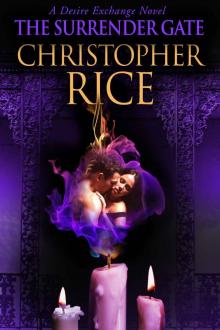 The Surrender Gate: A Desire Exchange Novel
The Surrender Gate: A Desire Exchange Novel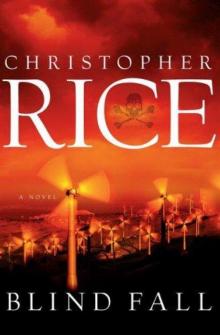 Blind Fall
Blind Fall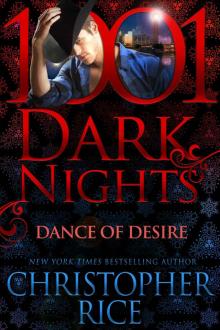 Dance of Desire (1001 Dark Nights)
Dance of Desire (1001 Dark Nights)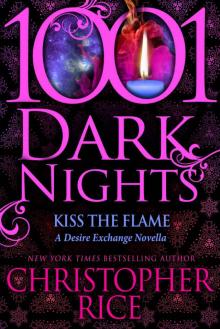 Kiss The Flame: A Desire Exchange Novella (1001 Dark Nights)
Kiss The Flame: A Desire Exchange Novella (1001 Dark Nights)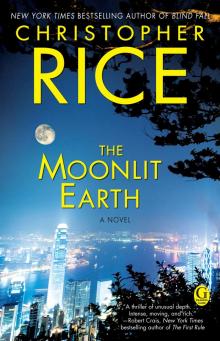 The Moonlit Earth
The Moonlit Earth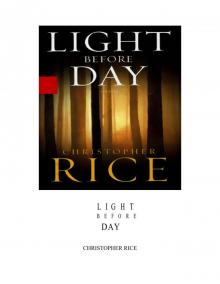 Light Before Day
Light Before Day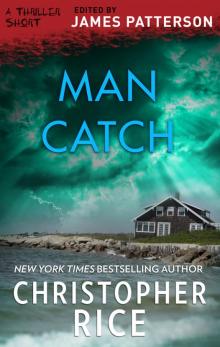 Man Catch
Man Catch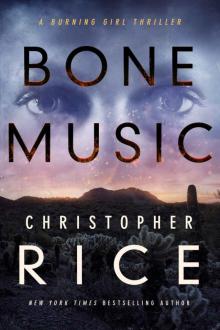 Bone Music
Bone Music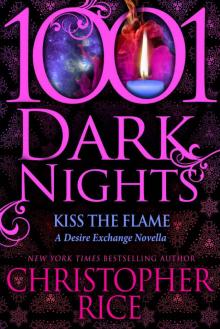 Kiss The Flame_A Desire Exchange Novella
Kiss The Flame_A Desire Exchange Novella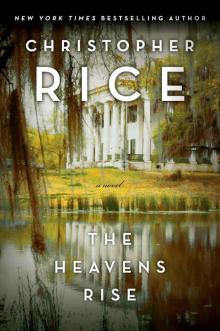 The Heavens Rise
The Heavens Rise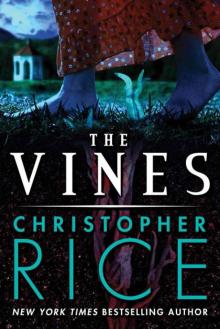 The Vines
The Vines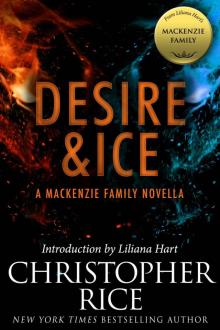 Desire & Ice: A MacKenzie Family Novella (The MacKenzie Family)
Desire & Ice: A MacKenzie Family Novella (The MacKenzie Family)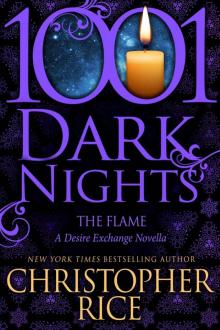 The Flame: A Desire Exchange Novella (1001 Dark Nights)
The Flame: A Desire Exchange Novella (1001 Dark Nights) The Snow Garden
The Snow Garden